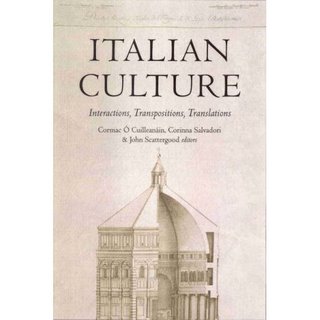 Languages appear to be in decline here in the UK. Annual surveys show that large numbers of students have stopped studying foreign languages at schools. Such declines will have a sharp effect on university teaching and in turn how departments rise to the challenge of teaching such students. Whether they will choose to learn a language at university is quite another hurdle.
Languages appear to be in decline here in the UK. Annual surveys show that large numbers of students have stopped studying foreign languages at schools. Such declines will have a sharp effect on university teaching and in turn how departments rise to the challenge of teaching such students. Whether they will choose to learn a language at university is quite another hurdle.When the professor of Italian Studies at Trinity College, Dublin (my alma mater) retired, there was a celebratory study day to mark her many years of service to the department. The papers given comprise the articles in this book. The title contains no reference to it being a Festschrift, and Professor Salvadori is in fact one of the volume's editors, so it should be considered a testament to the intellectual vibrancy of the department and to its broad range of interests, as much as it should be considered an homage to its former head of department. A highlight is Peter Armour's contribution on poet-friends in Dante's Florence, a paper he had to deliver sitting down he was so ill. His death, shortly thereafter, was a sad sad loss to Dante studies.
The opening article, written by Corinna Salvadori, is a moving and fascinating account of the history of Italian in the College. Provost John Hely-Hutchinson thought it would be 'highly useful to have Professors of modern languages established in the College', and before long two professorships, one of Italian and Spanish, and one of French and German, were established (in 1776). It was not met with universal approval. One Senior Fellow described the decision as 'pernicious', and wondered would the next step be a Professorship of Horsemanship. Languages, like horsemanship, were 'polite accomplishments' and 'teachers of modern languages, fencing, and dancing masters, and horse-riders, are not always the most eligible companions for youth' (p. 13). Part II of Salvadori's article then discusses the subject in College from the 1960s onwards. It is the story of dedicated teaching staff faced with neglect and disinterest. It is stunning to read the account of Provost Watts coming in to Salvadori's office to explain calmly that the department would remain open simply because it was the cheapest department in the College to run and thus its closure would make no significant saving. The department was for years run by just Corinna Salvadori and Clotilde Soave Bowe, both of whom taught a breadth and load that would not be considered possible now. External examiners would consistently praise the high quality of the degree and with incredulity learn it had all been done by just two people. In the 1980s the department expanded slowly but steadily offering ever stronger and broader preparations for its students. Medieval studies has certainly been the department's forte with two of its staff, Salvadori and Cormac Ó Cuilleanáin, being accomplished critics of the work of Dante and Boccaccio respectively. And it is Dante who looms so large at the absolute heart of the department, the man who made it all worthwhile.
He is the good man behind the great woman in this story.
I beg indulgence for a moment while I tell one anecdote. I was coming to the end of my first year in Italian and was feeling martyred at the huge amount of work we had to do. I'd taken Italian ab initio and felt I was utterly suffocating under verbs and paradigms and god knows what. An evening of poetry had been arranged in the department and Seamus Heaney was invited. Having extricated myself from some piece of work, I went along. Heaney read his translation of the Ugolino episode, in his Fieldwork (1979). It was stunning and beautiful. Corinna Salvadori got up to read the Italian. You could hear a pin drop. She read it with beauty and music and power and horror, and the hair raised on the back of my neck and my stomach churned, and I realized I was in the presence of something great. That evening I made my mind up to continue with Italian and to make an Eramsus application to go to the University of Bologna for a year. And after that all was changed, changed utterly.
It seems that people are returning to this idea that languages are a 'polite accomplishment'. Nothing is further from the truth, nor a more dangerous fallacy. A language that produces something like the Commedia cannot be accurately described as either polite or an accomplishment.
No comments:
Post a Comment